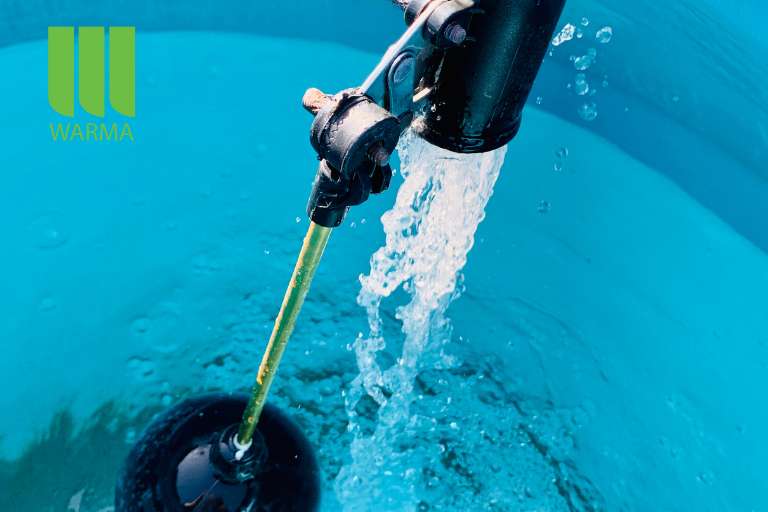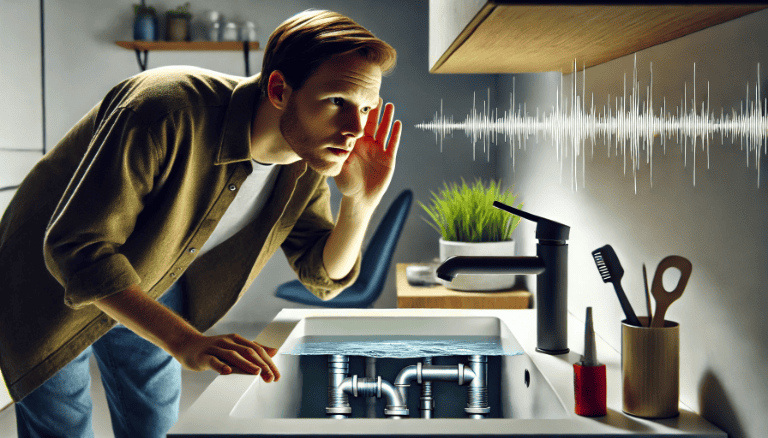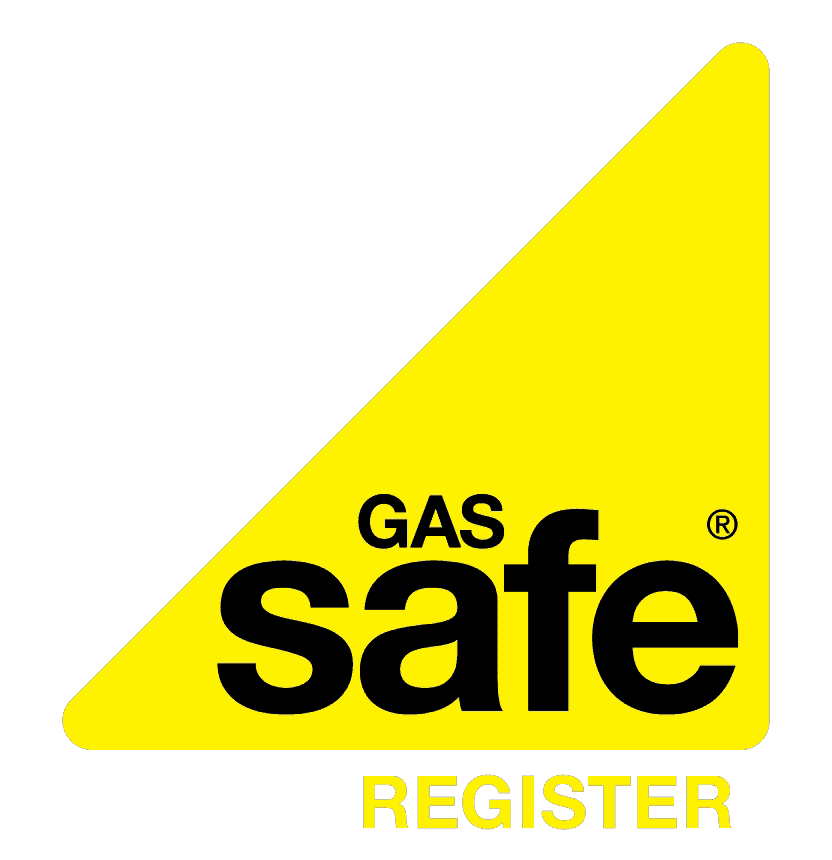Noisy Plumbing Problems Solved
Noisy plumbing problems can be a nuisance, often signalling an underlying issue that, if left unresolved, can worsen over time.
At Warma Heating and Plumbing, we understand the frustration of clanging, bubbling, and gurgling pipes, as well as other loud plumbing noises, and can provide solutions to restore peace to your home.
Below are some common noisy plumbing issues, explanations of what’s causing them, and effective ways to fix them.

Bubbling or Kettling Noises Coming from the Boiler
If your boiler sounds like a kettle boiling, this is typically caused by a build-up of limescale on the heat exchanger, a process known as kettling. Here’s what’s happening: cold water enters the boiler, where it contacts the heat exchanger’s surface. Over time, limescale deposits insulate small areas of the heat exchanger, causing them to overheat. When cold water contacts these superheated spots, it boils rapidly, creating steam bubbles. As the steam cools, it contracts and creates an implosive effect, resulting in the banging or kettling noise. This is a common issue in noisy plumbing systems.
Fixing the Problem:
Kettling not only causes noise but also reduces your boiler’s efficiency. It’s best to have a professional plumber handle this issue. We will partially drain the system and apply a chemical solution called Boiler Descaler to dissolve the limescale. Once the system is cleared, we’ll add a scale inhibitor to prevent further build-up, protecting the pipes and boiler. This simple maintenance step can prevent further kettling and improve the lifespan of your boiler, reducing those loud plumbing noises.
Tip for Prevention:
If you live in an area with hard water, consider installing a water softener to reduce the amount of limescale forming in your system. This can help protect not just your boiler but also other water-based appliances in your home and reduce noisy plumbing sounds. You must check that your boiler is suitable to have a water softener installed as with some boilers the softened water will cause irreparable damage to its internals.
Bouncing Ball Valves
If you hear a rhythmic banging noise coming from your loft or water storage tank, it’s likely caused by a bouncing ball valve. When water fills the tank, small waves and ripples form on the surface, causing the float (or ball) to bob up and down. As it bounces, it can hit against the tank walls, creating a loud and irritating noise, a common form of noisy plumbing in older homes.
Fixing the Problem:
There are a few ways to address a bouncing ball valve. First, you can try adjusting the inlet valve to control the flow and minimise surface disturbance in the tank. Alternatively, you might replace the valve with a quieter model designed to reduce noise. Adding a damper to stabilise the float can also prevent it from bouncing, especially in high-turbulence water tanks.

Visualisation for Clarity:
Imagine the float as a buoy bobbing on the surface of the water. When waves form, it moves with them, causing impacts that translate to noise. Adjusting or replacing the valve can keep the buoy (or float) stable, minimising the sound and reducing those annoying plumbing noises.
Pipes Creaking in the Morning
Many homeowners notice that pipes start to creak as their heating system warms up in the morning. This happens because metal pipes expand slightly when heated. If the pipes are installed tightly through notches in joists or pass through tight spaces, they may rub against surrounding materials as they expand, causing creaking sounds, a common type of noisy plumbing.
Fixing the Problem:
The best solution is to wrap the affected pipes with insulation or felt, particularly in areas where they come into contact with wood or other materials. However, reaching these spots might require lifting floorboards or removing parts of your wall or ceiling. While creaking sounds can be annoying, they rarely cause damage, so this is often a low-priority fix unless the noise is especially disruptive.
Visualisation for Clarity:
Think of it like a door that rubs against the frame when it expands. Adding some insulation around the pipes creates a soft barrier that reduces friction and muffles sound, helping to eliminate noisy plumbing creaks.
Noisy Radiators
If you hear ticking, whistling, or whining sounds from your radiators, the culprit is usually the thermostatic radiator valve (TRV).
These valves contain a thermodynamic compound that expands and contracts as it responds to temperature changes. As the radiator heats, the valve opens to release hot water, and as it cools, the valve closes to control the temperature.
The small movements within the valve can produce sounds that might be concerning but are usually harmless.

Fixing the Problem:
If the sound becomes disruptive, replacing the thermostatic radiator valves and refreshing the system’s water supply can help. If only one or two valves are making noise, it is possible you only need to replace those specific valves, which can save you time and expense.
Tip for Quiet Radiators:
Ensure your radiators are regularly bled. Trapped air can also cause noisy plumbing in the form of ticking and gurgling sounds, so releasing it through the bleed valve can help keep your system running quietly and efficiently.
Gurgling Pipes
Gurgling pipes usually indicate that water is moving too quickly through the system, typically because the central heating pump is set to a speed that’s too high. When water rushes too fast, it can create turbulence, which leads to the gurgling sound, a common noisy plumbing complaint.
Fixing the Problem:
Have a professional adjust the speed of the central heating pump. Most pumps offer speed settings from one to three, and lowering the speed may reduce the noise without affecting the warmth of your radiators. If lowering the pump speed results in radiators that don’t heat evenly, further work on the system’s pipework may be necessary to balance the flow.
Tip for Quieter Pipes:
If you hear gurgling, don’t hesitate to have the pump inspected. Catching this noisy plumbing issue early can prevent stress on the system, which helps your boiler and pump last longer.
Water Hammer
Water hammer is a powerful banging sound caused by the sudden stop of water flow in your pipes. When the flow stops, the momentum of the moving water has nowhere to go, causing the pipes to jolt. Water hammer is most common in older heating systems without modern safety mechanisms to absorb sudden water pressure changes and can be one of the most startling types of noisy plumbing.
Fixing the Problem:
A common solution for water hammer is to install an expansion vessel before the boiler. This vessel absorbs the shock caused by sudden changes in water pressure, reducing the force that jolts the pipes. A professional can assess your system to determine the best place for the expansion vessel, as well as inspect your system to ensure the pipes are securely fastened.
Visualisation for Clarity:
Imagine slamming on the brakes in a moving car. Just as passengers jolt forward from the momentum, water hammer causes pipes to jolt as the water suddenly stops. An expansion vessel acts as a cushion, absorbing the impact and protecting the pipes, preventing this kind of noisy plumbing.
When Noisy Plumbing Indicates a Bigger Problem
Noisy plumbing isn’t just a nuisance—it can sometimes signal larger issues within your plumbing system that may require urgent attention. While some sounds are harmless, others might indicate underlying problems that, if left unresolved, could lead to costly repairs down the line.
- Persistent Water Hammer: If water hammer occurs frequently, it could mean that your system lacks the necessary air chambers or water hammer arrestors. This can place excessive stress on your pipes, eventually causing them to loosen or crack. Installing an expansion vessel or water hammer arrestor can reduce the force within the pipes, protecting your plumbing from damage.
- Unusual Boiler Noises: If your boiler starts to emit kettling or banging noises, it’s often a sign of limescale build-up on the heat exchanger. Ignoring these sounds can reduce the efficiency of your boiler and, in severe cases, may lead to overheating or costly breakdowns. Regular boiler maintenance is essential to prevent this issue.
- Recurring Gurgling in Pipes: Continuous gurgling noises, especially when your central heating or water system isn’t in use, may indicate an airlock or blockages in the pipes. Over time, blockages can put extra strain on your system, potentially leading to leaks or other issues. A professional inspection can help locate and clear blockages before they cause further damage.
If you’re experiencing any of these symptoms, it’s wise to consult a professional plumber to assess your system. Addressing issues early can prevent minor problems from turning into major, costly repairs and ensure your plumbing runs smoothly.
How to Locate the Source of Noisy Plumbing
Identifying where a noise is coming from can help you or a plumber address noisy plumbing more effectively. Here are some tips for finding the source of various plumbing sounds in your home:
- Listen Closely to Different Fixtures: Determine if the noise is associated with a particular fixture, like a toilet, sink, or shower. For example, rattling or banging sounds from a toilet could indicate a loose fill valve or water hammer. Understanding the fixture involved can help narrow down the cause.
- Track When the Noise Occurs: Noisy plumbing often has a specific trigger. Pay attention to whether sounds occur when you turn on the hot water, flush a toilet, or start the heating system. For instance, gurgling pipes when the heating system starts up may indicate that your pump speed is too high or that there’s air in the pipes.

- Check Walls and Floorboards: Many plumbing pipes run within walls, under floors, or even through ceilings. If you hear creaking or knocking sounds in these areas, it may be due to pipes expanding and contracting or rubbing against wood. Creaking sounds coming from floors and walls, especially when the heating turns on, could indicate a need for pipe insulation.
- Inspect Your Loft and Basement: Some noises, like the banging of a bouncing ball valve, can come from the loft or water storage tank. These noises may be heard most clearly in specific parts of your home, like upstairs bedrooms. Checking your loft and basement can help determine if your water tank, boiler, or ball valve is the culprit.
Once you’ve pinpointed the general area or specific fixture that’s making noise, you’ll have a clearer idea of the issue and can relay this information to a professional plumber. Proper diagnosis can save time and ensure your noisy plumbing is addressed effectively.
Noisy Plumbing Can Usually Be Resolved
Noisy plumbing can be more than a minor annoyance; it can indicate underlying issues that may lead to costly repairs if left unchecked. At Warma Heating and Plumbing, our skilled professionals are experienced in diagnosing and solving all kinds of noisy plumbing issues, from kettling boilers and creaking pipes to banging ball valves and water hammer.
If you’re dealing with any of these plumbing noises, contact us to arrange an inspection and put an end to noisy plumbing in your home.






